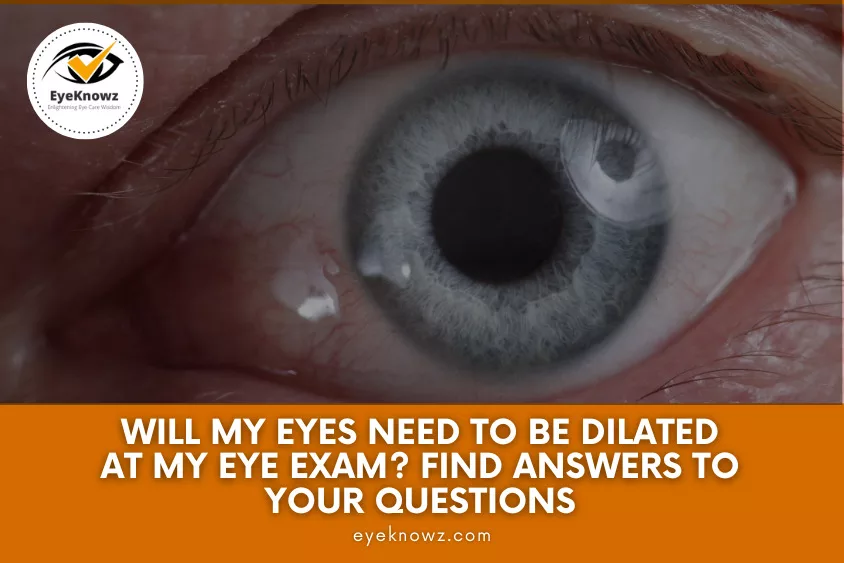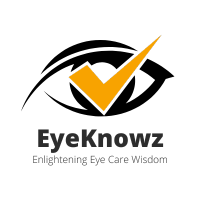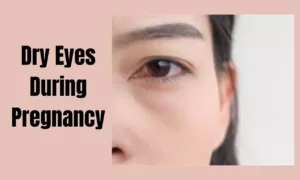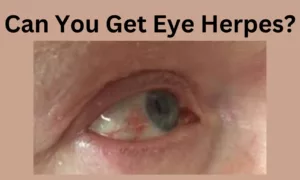Will My Eyes Need to Be Dilated at My Eye Exam? Get insights into whether your upcoming eye exam will require eye dilation and learn what to expect during the process.
About:
A regular vision test and eye exam are essential to maintaining good eye health. You may wonder, however, why doctors always dilate my eyes. In this way, they can see your entire eye. A regular wellness check at your eye doctor often includes dilatation of your pupils during an eye health exam.
People may also avoid dilation during their annual eye exams by talking to their ophthalmologist or optometrist. In their opinion, an eye exam can be successful without dilation of the eyes. In some situations, it is possible to undergo an eye examination without dilating your eyes. However, it will not be a very thorough eye examination, and your ophthalmologist or optometrist may miss some serious eye issues.
Having your dilated pupils eye exam can help your doctor determine if you have glaucoma or any other problems with your eyes. If you have a family history of eye disease or risk factors, ensure the eye doctor performs a dilated eye examination. Maintaining healthy vision is essential, but will my eyes need to be dilated at my Eye Exam? We’ve got answers to all your questions about dilating your eyes.
Eye Dilation:
Should eyes be dilated before an eye exam? Eye dilation is a routine eye exam procedure performed by an optometrist or ophthalmologist. A patient’s pupil is dilated by administering dilating eye drops to their eyes. It will lead to the patient’s pupils expanding and opening up all the way. There are chemicals in the liquid that block the parasympathetic receptors in your iris’s sphincter. The iris dilator muscles constrict as a result, causing your pupil to enlarge due to this sphincter being unable to prevent this. After applying the drops to your eye, it takes about 30 minutes for the dilation to take effect.
Following that, your doctor may perform the following tests:
Visual acuity test:
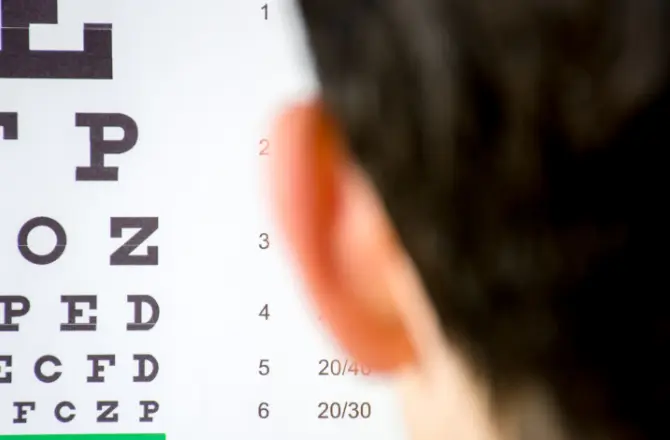
The ophthalmologist will ask you to read at a distance and up close while dilating your eyes.
Visual field test:
This test involves a small flashing light that goes on and off on either side of your face. To test your peripheral vision, you tell the ophthalmologist when and where you see it.
Eye muscle function test:
As your doctor moves an object around in your visual field, you’ll be asked to follow it with your eyes. In this process, the muscles located around your eyes are checked for any problems.
Tonometry test:
Using a special machine, your doctor will blow a puff of air into your eye. Additionally, they may use a special tool to touch the eye gently. You will need to do this in order to check the pressure in your eyes.
A pupil response test:
The doctor will shine a light into your eyes and check how your pupils respond to the light.
What can a doctor diagnose?
A doctor can see more of your eye back, including your optic nerve and retina, with this procedure. Many common eye diseases and conditions can be diagnosed earlier by your eye doctor. You can get a comprehensive eye examination by dilation. Early detection of diseases can make the difference between severe and manageable vision problems. Your optometrist can detect the following by dilation of your pupils:
Glaucoma: A condition in which fluid accumulates at the front of the eye, causing damage to the optic nerve.
High blood pressure: Your retina’s blood vessels are at risk of hardening, leaking, and haemorrhaging when you have high blood pressure.
Macular degeneration: Your eye doctor will check for de-pigmentation, pigment clumping, and new blood vessels developing under your retina.
Cataracts: Normally caused by ageing or injury, cataracts occur when your eye’s lens thickens and becomes cloudy.
Retinal detachment: When your retina separates from oxygen-supplying blood vessels, you suffer from retinal detachment. A medical emergency exists in this situation.
Age-related macular degeneration: The macula is a part of the retina that weakens with age. Your macula is responsible for controlling your central vision. You may have problems recognizing people’s faces when it deteriorates or completing daily tasks like driving.
Diabetic retinopathy: The retina displays abnormal blood vessel growth, swelling, and leakage.
Side effects of dilation:
A dilated pupil will likely result in a series of symptoms that make it slightly uncomfortable to use your eyes after an eye exam. In rare cases, it is also possible to have an allergic reaction to dilation eye drops. You can also experience headaches after eye dilation. Some people avoid eye dilation because of these symptoms. These symptoms are generally mild, but they are still worth noting. You will experience the following dilated eye exam side effects:
- Blurred vision
- Having difficulty focusing on nearby objects
- Sensitive to bright lights
- Glare from certain objects when you look at them
If you have your eyes dilated, the side effects usually last about two to six hours but can last longer or shorter depending on how your eyes react to the eye drops. To avoid pain from sensitivity, wear sunglasses until your pupils return to normal. Due to this sensitivity, you may be unable to drive, so make sure you arrange for someone to drive you after seeing your ophthalmologist.
Eye dilation: Factors your eye doctor considers:
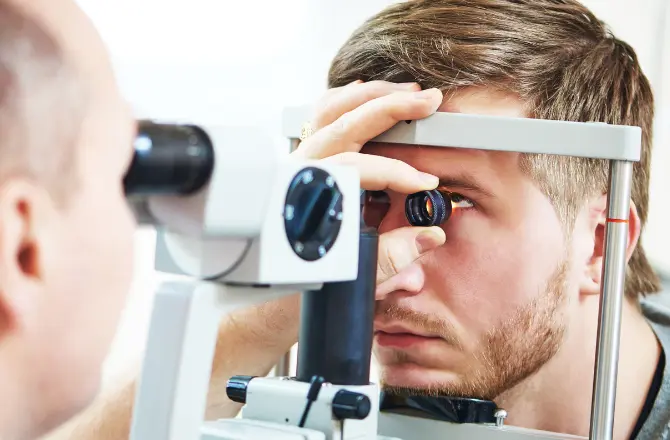
Your health, age, and eye disease risk determine whether you need your eyes dilated. Your eye doctor determines eye dilation by considering the following factors:
Ø Age:
Older people are more likely to suffer from eye diseases. It is recommended that people over the age of 60 undergo a dilated eye exam every two years.
Ø Family history:
You need your eyes dilated if you have genetic eye disease or have existing eye problems, so your ophthalmologist can check for and maintain them.
Ø Ethnic background:
Glaucoma is more prevalent among certain demographics, such as Blacks and Latinos. A dilated eye exam should be performed every two years starting at age 40 for people who fall into those demographics.
Ø Your current symptoms:
In some cases, symptoms can be indicators of multiple health conditions, and dilating the eyes is the only way to rule out specific conditions.
Ø Purpose of the eye exam:
Have you ever wondered if you might need vision correction if you’re under 40 and healthy? You should have a dilated exam at least every few years and more frequently as you age, although one is not necessary this time. Starting with dilation is a good idea if this is your first eye exam. Consult your doctor about this.
Ø Vision issues:
When you have a vision problem, your eye doctor may dilate your eyes to assess your vision thoroughly.
Final Words:
Many people fear having eye dilation done because they have no idea what it is or how it works. For those getting an eye exam for the first time, it is a stressful experience, and they end up being nervous every time they have one. If you are recommended to dilate your eyes by your eye doctor, be sure to schedule regular eye exams.
Detection of damage and early diagnosis of the disease can help prevent irreparable damage to your vision and your health. Despite the inconvenience that comes from dilating your eyes in the short run, it provides long-term safety and peace of mind by helping your optometrist identify several serious problems at an early stage.
FAQs
How to make eye dilation go away faster?
To help eye dilation subside more quickly, try staying in a dimly lit environment, wearing sunglasses when exposed to bright light, and avoiding activities that strain your eyes, such as reading or staring at screens for an extended period.
How long for dilated eyes to return to normal?
The duration for dilated eyes to return to normal can vary, but it usually takes about 4 to 6 hours. However, for some individuals, it might take up to 24 hours for the effects of dilation to wear off completely.
What not to do after eye dilation?
You should avoid driving after eye dilation, especially in bright light, since your vision may be impaired. Avoid tasks that require sharp focus, such as reading fine print or using a computer extensively. Also, avoid rubbing your eyes, as it can lead to irritation and prolong the dilation effects.

